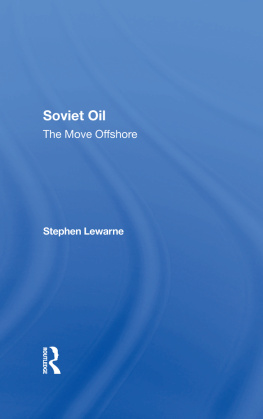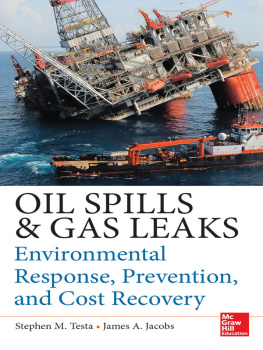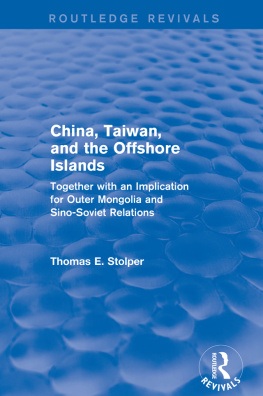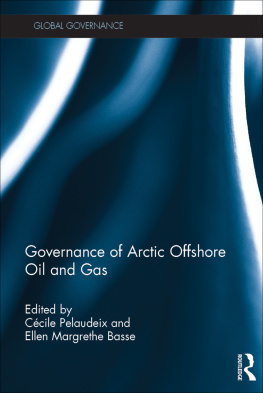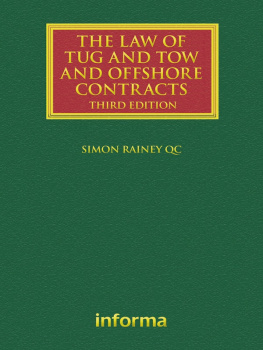Soviet Oil
The Move Offshore
Soviet Oil
The Move Offshore
Stephen Lewarne
First published 1988 by Westview Press, Inc.
Published 2019 by Routledge
52 Vanderbilt Avenue, New York, NY 10017
2 Park Square, Milton Park, Abingdon, Oxon OX14 4RN
Routledge is an imprint of the Taylor & Francis Group, an informa business
Copyright 1988 Taylor & Francis
All rights reserved. No part of this book may be reprinted or reproduced or utilised in any form or by any electronic, mechanical, or other means, now known or hereafter invented, including photocopying and recording, or in any information storage or retrieval system, without permission in writing from the publishers.
Notice:
Product or corporate names may be trademarks or registered trademarks, and are used only for identification and explanation without intent to infringe.
Library of Congress Cataloging-in-Publication Data
Lewarne, Stephen.
Soviet oil: the move offshore/by Stephen Lewarne.
p. cm.(Westview special studies on the Soviet Union and
Eastern Europe)
Bibliography: p.
Includes index.
ISBN 0-8133-7641-6
1. Offshore oil industrySoviet Union. 2. Offshore oil industry
Arctic Ocean. I. Title. II. Series.
HD9575.S652L48 1988
333.8'232'0947dc19 88-10642
CIP
ISBN 13: 978-0-367-28832-7 (hbk)
To David Campbell, Peter Gould, Richard LePage and Kathleen Reyno
My research on this work began while I was at the Institute of Soviet and East European Studies, Carleton University, in Ottawa, Canada, from 1985 to 1987, and I am most indebted to the institute and its members. Particularly, I would like to express my deepest thanks and admiration for Prof. Carl McMillan, whose patience and guidance have seen me through nearly eight years of Soviet affairs. It was his idea that I undertake a study on the Soviet offshore oil industry. His research guidance and comments on several early drafts were crucial to the study's development. I would also like to thank Prof. Larry Black, Prof. Richard Carson, Donna Harper, Carl Reid, Peter Gould, and David Campbell--all members of the institute.
Special thanks must be given to John Hanmgan, who obtained several crucial documents and studies for me from Circumpolar Affairs of the Canadian Government, and to Arpad Abonyi of Investment Canada. My thanks also go to Sergei Vecherskii and Prof. Bogomosov of the Economics Department of Leningrad (Zhdanov) University, both of whom assisted my research efforts while I was on a special study term in the Soviet Union in 1986.
Maureen Korp prepared the final text edit and Kathleen Hutnik a preliminary edit. Their comments and corrections were needed and appreciated. Peter Gould and Lt. Michael Geskin reviewed the transliteration in the book and provided me with useful advice. John Hollingsworth of Indiana University's Department of Geography and Barbara McCuaig of Interact Ltd., Ottawa, did the cartography work.
At Indiana University I want to thank Prof. Robert Campbell for his help in the final publishing stages of the book, Prof. Christopher Waller for his support, Dorene Cornwell for computer assistance, and Karen Niggle of the Indiana Russian and East European Institute.
Michael Kelly, Patrick Caragata, Alan Darrise, Kathleen Reyno, Ken Hart, Chummer Farina, Catherine Disher and Richard LePage all read drafts of the manuscript and offered useful advice.
Susan Laury was especially helpful in the final few months of preparing the manuscript for publication, as were Carlos Pinerua and Dean Dudley. Thanks must also be expressed to my mother and father and Andrew Lewarne for their support.
Finally, I would like to thank the Mellon Foundation, the Indiana Russian and East European Institute, the Canadian Department of National Defence, and the Office of Associate Dean Timothy Londergan of Indiana University's Graduate School. All provided financial support for the study.
I am, of course, responsible for any errors or omissions.
Stephen M. Lewarne
Indiana University
Bloomington, Indiana
1
The Importance of Soviet Petroleum and the Role of Offshore Oil: An Introduction
The Soviet Union has elicited close scrutiny in the West over its role as both an oil producer and exporter. This scrutiny has become more pronounced over the last decade when it became apparent that the Soviet Union was truly an oil "giant". It had become the largest producer of oil in the world by the mid-1970s, a position previously held by the United States. Further, when the Soviet Union in 1979 surpassed Iran, becoming second only to Saudi Arabia in oil exports, it became clear to analysts that petroleum was a key source of the Soviet Union's economic strength and was crucial to the Soviet Union's presence in the global economy. The production of oil for the Soviet Union, therefore, is more than just an economic necessity, it is a source of prestige and an instrument of political power.
Over the last decade the Soviet Union has experienced problems in its petroleum industry. Among these are, notably, the decreasing rates of growth both for petroleum production and the discovery of new petroleum reserves. The annual rate of growth in petroleum production has fallen from an average of 9% between 1960 and 1970 to 4% between 1975 and 1980, and to -0.25% between 1980 and 1985. Particularly disturbing to the Soviets was the absolute decline between 1983 and 1985 when production went from 616 million tons a year (mty) to 596 mty. This was increased to 611 mty in 1986 and is estimated at 624 mty in 1987. The production increases in these two years are, however, deceptive because they were produced at an increasing cost. Most of the increase is attributable to more discipline at the work sites than to long-term factors such as increased exploratory drilling and technical innovation. What has not been addressed is the crucial decline in the reserves-to-production ratio (the amount of known explored reserves as a share of oil production) of -3.9% between 1970 and 1984. It is unlikely that production figures like those of 1987 will continue if these problems are not addressed. Because petroleum is the Soviet Union's chief earner of hard currency, these problems are that much more acute.
Soviet petroleum is significant in five ways. First, if petroleum production begins to fall off to the extent that it cannot satisfy domestic needs, then serious bottlenecks will begin to form in the economy until other energy sources can be drawn upon. Second, petroleum has been and still is the Soviet Union's chief earner of hard currency. For quite a while it has been the preoccupation of Soviet planners to raise the quality of Soviet manufactured goods and increase their salability in hard currency markets. Yet to date for a number of reasons this has not occurred. The consequence is that petroleum is really the principal "tool" available to Soviet planners when they wish to reduce the country's trade deficit or increase earnings to pay for hard currency imports. Third, in the post-OPEC world, oil still equates with power. Security of reserves can allow a country considerable leverage in its economic and political dealings with both its allies and its enemies. In the case of the Soviet Union, a surplus of oil means it can remain aloof at times from the Middle East conflict when the conflict centers around oil. Fourth, Soviet oil is significant as an instrument of Soviet power in East Europe. Fifth, if the reserves-to-production ratio begins to seriously decline, then the Soviet Union and those who rely upon its petroleum for their energy needs may be forced to turn to the Middle East for petroleum. Such concentration could increase tension in a region already prone to conflict.


